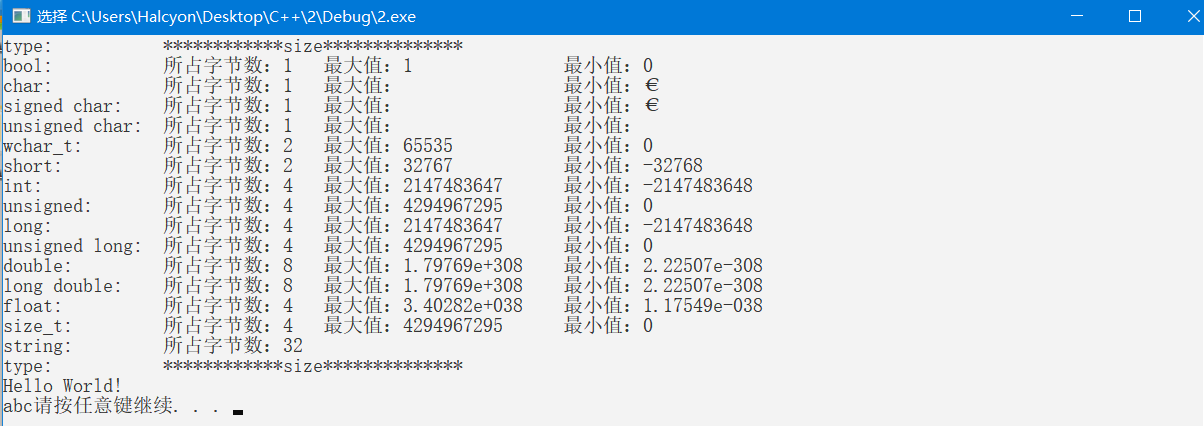目录
1. 七种基本的 C++ 数据类型

各种变量类型在内存中存储值时需要占用的内存,以及该类型的变量所能存储的最大值和最小值。
注意:默认情况下,int、short、long都是带符号的,即 signed。
注意:long int 8 个字节,int 都是 4 个字节,早期的 C 编译器定义了 long int 占用 4 个字节,int 占用 2 个字节,新版的 C/C++ 标准兼容了早期的这一设定。

也可以通过代码输出各变量类型的信息:
#include<iostream>
#include <limits>
using namespace std;
int main()
{
cout << "type: \t\t" << "************size**************"<< endl;
cout << "bool: \t\t" << "所占字节数:" << sizeof(bool);
cout << "\t最大值:" << (numeric_limits<bool>::max)();
cout << "\t\t最小值:" << (numeric_limits<bool>::min)() << endl;
cout << "char: \t\t" << "所占字节数:" << sizeof(char);
cout << "\t最大值:" << (numeric_limits<char>::max)();
cout << "\t\t最小值:" << (numeric_limits<char>::min)() << endl;
cout << "signed char: \t" << "所占字节数:" << sizeof(signed char);
cout << "\t最大值:" << (numeric_limits<signed char>::max)();
cout << "\t\t最小值:" << (numeric_limits<signed char>::min)() << endl;
cout << "unsigned char: \t" << "所占字节数:" << sizeof(unsigned char);
cout << "\t最大值:" << (numeric_limits<unsigned char>::max)();
cout << "\t\t最小值:" << (numeric_limits<unsigned char>::min)() << endl;
cout << "wchar_t: \t" << "所占字节数:" << sizeof(wchar_t);
cout << "\t最大值:" << (numeric_limits<wchar_t>::max)();
cout << "\t\t最小值:" << (numeric_limits<wchar_t>::min)() << endl;
cout << "short: \t\t" << "所占字节数:" << sizeof(short);
cout << "\t最大值:" << (numeric_limits<short>::max)();
cout << "\t\t最小值:" << (numeric_limits<short>::min)() << endl;
cout << "int: \t\t" << "所占字节数:" << sizeof(int);
cout << "\t最大值:" << (numeric_limits<int>::max)();
cout << "\t最小值:" << (numeric_limits<int>::min)() << endl;
cout << "unsigned: \t" << "所占字节数:" << sizeof(unsigned);
cout << "\t最大值:" << (numeric_limits<unsigned>::max)();
cout << "\t最小值:" << (numeric_limits<unsigned>::min)() << endl;
cout << "long: \t\t" << "所占字节数:" << sizeof(long);
cout << "\t最大值:" << (numeric_limits<long>::max)();
cout << "\t最小值:" << (numeric_limits<long>::min)() << endl;
cout << "unsigned long: \t" << "所占字节数:" << sizeof(unsigned long);
cout << "\t最大值:" << (numeric_limits<unsigned long>::max)();
cout << "\t最小值:" << (numeric_limits<unsigned long>::min)() << endl;
cout << "double: \t" << "所占字节数:" << sizeof(double);
cout << "\t最大值:" << (numeric_limits<double>::max)();
cout << "\t最小值:" << (numeric_limits<double>::min)() << endl;
cout << "long double: \t" << "所占字节数:" << sizeof(long double);
cout << "\t最大值:" << (numeric_limits<long double>::max)();
cout << "\t最小值:" << (numeric_limits<long double>::min)() << endl;
cout << "float: \t\t" << "所占字节数:" << sizeof(float);
cout << "\t最大值:" << (numeric_limits<float>::max)();
cout << "\t最小值:" << (numeric_limits<float>::min)() << endl;
cout << "size_t: \t" << "所占字节数:" << sizeof(size_t);
cout << "\t最大值:" << (numeric_limits<size_t>::max)();
cout << "\t最小值:" << (numeric_limits<size_t>::min)() << endl;
cout << "string: \t" << "所占字节数:" << sizeof(string) << endl;
// << "\t最大值:" << (numeric_limits<string>::max)() << "\t最小值:" << (numeric_limits<string>::min)() << endl;
cout << "type: \t\t" << "************size**************"<< endl;
return 0;
}
2. C++ 中的变量定义

可以由一个或多个标识符名称组成,多个标识符之间用逗号分隔。下面列出几个有效的声明:
int i, j, k;
char c, ch;
float f, salary;
double d;变量可以在声明的时候被初始化(指定一个初始值)。初始化器由一个等号,后跟一个常量表达式组成,如下所示:
extern int d = 3, f = 5; // d 和 f 的声明
int d = 3, f = 5; // 定义并初始化 d 和 f
byte z = 22; // 定义并初始化 z
char x = 'x'; // 变量 x 的值为 'x'3. C++ 中的变量声明
变量声明向编译器保证变量以给定的类型和名称存在,这样编译器在不需要知道变量完整细节的情况下也能继续进一步的编译。变量声明只在编译时有它的意义,在程序连接时编译器需要实际的变量声明。
当使用多个文件且只在其中一个文件中定义变量时(定义变量的文件在程序连接时是可用的),变量声明就显得非常有用。可以使用 extern 关键字在任何地方声明一个变量。虽然可以在 C++ 程序中多次声明一个变量,但变量只能在某个文件、函数或代码块中被定义一次。
变量在头部就已经被声明,但它们是在主函数内被定义和初始化。
#include <iostream>
using namespace std;
// 变量声明
extern int a, b;
extern int c;
extern float f;
int main ()
{
// 变量定义
int a, b;
int c;
float f;
// 实际初始化
a = 10;
b = 20;
c = a + b;
cout << c << endl ;
f = 70.0/3.0;
cout << f << endl ;
return 0;
}同样,函数也需要声明和定义:
// 函数声明
int func();
int main()
{
// 函数调用
int i = func();
}
// 函数定义
int func()
{
return 0;
}4. C++ 变量作用域
作用域是程序的一个区域,一般来说有三个地方可以定义变量:
-
在函数或一个代码块内部声明的变量,称为局部变量。
-
在函数参数的定义中声明的变量,称为形式参数。
-
在所有函数外部声明的变量,称为全局变量。
局部变量
在函数或一个代码块内部声明的变量,称为局部变量。它们只能被函数内部或者代码块内部的语句使用。
#include <iostream>
using namespace std;
int main ()
{
// 局部变量声明
int a, b;
int c;
// 实际初始化
a = 10;
b = 20;
c = a + b;
cout << c;
return 0;
}全局变量
在所有函数外部定义的变量(通常是在程序的头部),称为全局变量。全局变量的值在程序的整个生命周期内都是有效的。
全局变量可以被任何函数访问。也就是说,全局变量一旦声明,在整个程序中都是可用的。
#include <iostream>
using namespace std;
// 全局变量声明
int g;
int main ()
{
// 局部变量声明
int a, b;
// 实际初始化
a = 10;
b = 20;
g = a + b;
cout << g;
return 0;
}局部变量和全局变量的名称可以相同,但是在函数内,局部变量的值会覆盖全局变量的值。
#include <iostream>
using namespace std;
// 全局变量声明
int g = 20;
int main ()
{
// 局部变量声明
int g = 10;
cout << g;
return 0;
}





















 1394
1394











 被折叠的 条评论
为什么被折叠?
被折叠的 条评论
为什么被折叠?








